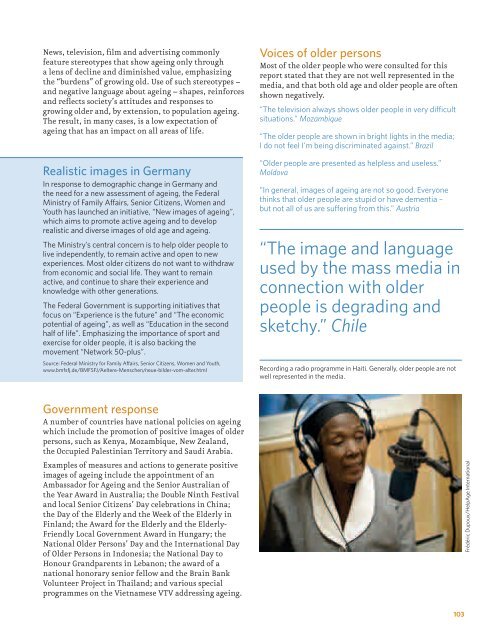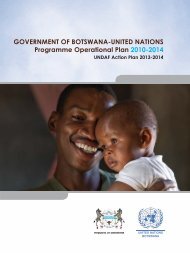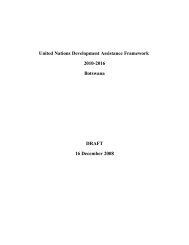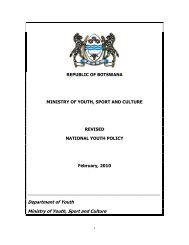Ageing in the Twenty-First Century: - HelpAge International
Ageing in the Twenty-First Century: - HelpAge International
Ageing in the Twenty-First Century: - HelpAge International
Create successful ePaper yourself
Turn your PDF publications into a flip-book with our unique Google optimized e-Paper software.
News, television, film and advertis<strong>in</strong>g commonly<br />
feature stereotypes that show age<strong>in</strong>g only through<br />
a lens of decl<strong>in</strong>e and dim<strong>in</strong>ished value, emphasiz<strong>in</strong>g<br />
<strong>the</strong> “burdens” of grow<strong>in</strong>g old. Use of such stereotypes –<br />
and negative language about age<strong>in</strong>g – shapes, re<strong>in</strong>forces<br />
and reflects society’s attitudes and responses to<br />
grow<strong>in</strong>g older and, by extension, to population age<strong>in</strong>g.<br />
The result, <strong>in</strong> many cases, is a low expectation of<br />
age<strong>in</strong>g that has an impact on all areas of life.<br />
Realistic images <strong>in</strong> Germany<br />
In response to demographic change <strong>in</strong> Germany and<br />
<strong>the</strong> need for a new assessment of age<strong>in</strong>g, <strong>the</strong> Federal<br />
M<strong>in</strong>istry of Family Affairs, Senior Citizens, Women and<br />
Youth has launched an <strong>in</strong>itiative, “New images of age<strong>in</strong>g”,<br />
which aims to promote active age<strong>in</strong>g and to develop<br />
realistic and diverse images of old age and age<strong>in</strong>g.<br />
The M<strong>in</strong>istry’s central concern is to help older people to<br />
live <strong>in</strong>dependently, to rema<strong>in</strong> active and open to new<br />
experiences. Most older citizens do not want to withdraw<br />
from economic and social life. They want to rema<strong>in</strong><br />
active, and cont<strong>in</strong>ue to share <strong>the</strong>ir experience and<br />
knowledge with o<strong>the</strong>r generations.<br />
The Federal Government is support<strong>in</strong>g <strong>in</strong>itiatives that<br />
focus on “Experience is <strong>the</strong> future” and “The economic<br />
potential of age<strong>in</strong>g”, as well as “Education <strong>in</strong> <strong>the</strong> second<br />
half of life”. Emphasiz<strong>in</strong>g <strong>the</strong> importance of sport and<br />
exercise for older people, it is also back<strong>in</strong>g <strong>the</strong><br />
movement “Network 50-plus”.<br />
Source: Federal M<strong>in</strong>istry for Family Affairs, Senior Citizens, Women and Youth,<br />
www.bmfsfj.de/BMFSFJ/Aeltere-Menschen/neue-bilder-vom-alter.html<br />
Voices of older persons<br />
Most of <strong>the</strong> older people who were consulted for this<br />
report stated that <strong>the</strong>y are not well represented <strong>in</strong> <strong>the</strong><br />
media, and that both old age and older people are often<br />
shown negatively.<br />
“The television always shows older people <strong>in</strong> very difficult<br />
situations.” Mozambique<br />
“The older people are shown <strong>in</strong> bright lights <strong>in</strong> <strong>the</strong> media;<br />
I do not feel I’m be<strong>in</strong>g discrim<strong>in</strong>ated aga<strong>in</strong>st.” Brazil<br />
“Older people are presented as helpless and useless.”<br />
Moldova<br />
“In general, images of age<strong>in</strong>g are not so good. Everyone<br />
th<strong>in</strong>ks that older people are stupid or have dementia –<br />
but not all of us are suffer<strong>in</strong>g from this.” Austria<br />
“The image and language<br />
used by <strong>the</strong> mass media <strong>in</strong><br />
connection with older<br />
people is degrad<strong>in</strong>g and<br />
sketchy.” Chile<br />
Record<strong>in</strong>g a radio programme <strong>in</strong> Haiti. Generally, older people are not<br />
well represented <strong>in</strong> <strong>the</strong> media.<br />
Government response<br />
A number of countries have national policies on age<strong>in</strong>g<br />
which <strong>in</strong>clude <strong>the</strong> promotion of positive images of older<br />
persons, such as Kenya, Mozambique, New Zealand,<br />
<strong>the</strong> Occupied Palest<strong>in</strong>ian Territory and Saudi Arabia.<br />
Examples of measures and actions to generate positive<br />
images of age<strong>in</strong>g <strong>in</strong>clude <strong>the</strong> appo<strong>in</strong>tment of an<br />
Ambassador for <strong>Age<strong>in</strong>g</strong> and <strong>the</strong> Senior Australian of<br />
<strong>the</strong> Year Award <strong>in</strong> Australia; <strong>the</strong> Double N<strong>in</strong>th Festival<br />
and local Senior Citizens’ Day celebrations <strong>in</strong> Ch<strong>in</strong>a;<br />
<strong>the</strong> Day of <strong>the</strong> Elderly and <strong>the</strong> Week of <strong>the</strong> Elderly <strong>in</strong><br />
F<strong>in</strong>land; <strong>the</strong> Award for <strong>the</strong> Elderly and <strong>the</strong> Elderly-<br />
Friendly Local Government Award <strong>in</strong> Hungary; <strong>the</strong><br />
National Older Persons’ Day and <strong>the</strong> <strong>International</strong> Day<br />
of Older Persons <strong>in</strong> Indonesia; <strong>the</strong> National Day to<br />
Honour Grandparents <strong>in</strong> Lebanon; <strong>the</strong> award of a<br />
national honorary senior fellow and <strong>the</strong> Bra<strong>in</strong> Bank<br />
Volunteer Project <strong>in</strong> Thailand; and various special<br />
programmes on <strong>the</strong> Vietnamese VTV address<strong>in</strong>g age<strong>in</strong>g.<br />
Frédéric Dupoux/<strong>HelpAge</strong> <strong>International</strong><br />
103







